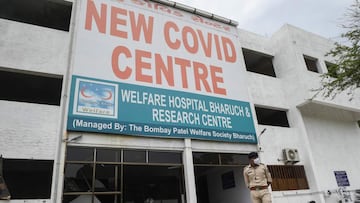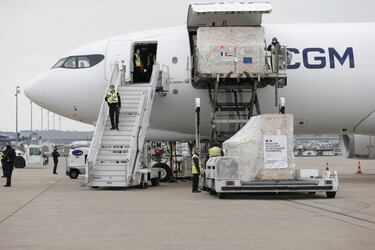Covid in India: shortage of vaccines and a new variant
The situation regarding coronavirus in India has worsened significantly over recent weeks and the this is magnified by the lack of vaccines and the risk of new strains.

Vaccine shortage and potentially dangerous new covid-19 strains. That is the concerning picture facing India.
The country posted a record daily rise of 401,993 new coronavirus cases on Saturday as the country opened up its mega vaccination drive to all adults, although several states warned of acute vaccine shortages.
- Covid vaccines: live updates
- Severe side effects after covid-19 vaccination explained
- Over five million people are missing their second covid-19 dose
- Causes of Covid-19 vaccines side effects
India’s limited covid-19 vaccines
India, the world's biggest producer of covid-19 vaccines, has a limited number of shots available domestically, worsening a grim second wave of infections that has left hospitals and morgues overflowing while families scramble for increasingly scarce medicines and oxygen.
"We hope that we will get vaccines tomorrow or the day after ... I ask you to please not queue up at vaccination centres on Saturday," the Chief Minister of the hard-hit state of Delhi, said in on Friday.
Hundreds of people were seen queuing across Ahmedabad, the main commercial city in Prime Minister Narendra Modi's home state of Gujarat to get vaccinated.
A fire in a hospital in some 190 km (115 miles) north of Ahmedabad killed 16 coronavirus patients and two staff, the latest in a series of deadly accidents at hospitals.
Covid mutations could ‘evade immune response’
A forum of scientific advisers set up by the Indian government has told authorities about minor mutations in some samples of the coronavirus that could "possibly evade immune response" and require more study, a leader of the forum has told Reuters.
However the advisers said while they were flagging the mutations, there was no reason currently to believe they were expanding or could be dangerous.

Scientists are studying what led to the current surge in cases in India and particularly whether a variant first detected in the country, called B.1.617, is to blame. The World Health Organization has not declared the Indian variant a "variant of concern," as it has done for variants first detected in Britain, Brazil and South Africa. But the WHO said on April 27 that its early modelling, based on genome sequencing, suggested that B.1.617 had a higher growth rate than other variants circulating in India.
The forum of advisers, known as the Indian SARS-CoV-2 Genetics Consortium, or INSACOG, has now found more mutations in the coronavirus that it thinks need to be tracked closely.
"We are seeing some mutation coming up in some samples that could possibly evade immune responses," said Shahid Jameel, chair of the scientific advisory group of INSACOG and a top Indian virologist. He did not say if the mutations have been seen in the Indian variant or any other strain.
"Unless you culture those viruses and test them in the lab, you can't say for sure. At this point, there is no reason to believe that they are expanding or if they can be dangerous, but we flagged it so that we keep our eye on the ball," he said.
INSACOG brings together 10 national research laboratories.
India reported more than 400,000 new covid-19 cases for the first time on Saturday. The rampaging infections have collapsed its health system in places including capital New Delhi, with shortages of medical oxygen and hospital beds.
WHO lists Moderna for emergency use
The World Health Organization has listed Moderna's covid-19 vaccine for emergency use, the agency said on Friday, the fifth to be given the status meant to expedite countries' own approval of shots.
"The objective is to make medicines, vaccines and diagnostics available as rapidly as possible to address the emergency," the WHO said in a statement.

WHO Assistant Director-General Mariangela Simao said on Friday it was important to have more vaccines available because of supply problems for other shots, including from India, a main source of vaccines for the global COVAX vaccine sharing programme. India has restricted exports because of a crisis of infections.
Moderna announced this week an expansion plan for its production network to boost its capacity to up to 3 billion doses in 2022.
The WHO's Strategic Advisory Group of Experts on Immunization (SAGE) already in January had recommended Moderna's vaccine for all age groups 18 and above. Pfizer and its German partner BionTech's shot, also an mRNA vaccine like Moderna's, was the first vaccine to get a WHO emergency use listing in the final hours of 2020. Since then, the WHO has added vaccines from Astrazeneca-SK Bio, Serum Institute of India and Johnson & Johnson vaccines to the list.
The Geneva-based health organization is still considering covid-19 vaccines from Sinopharm and Sinovac following an extended review, with decisions due by the end ofnext week.
Sputnik arrives in India
India has received 150,000 Sputnik-V vaccine doses from Russia, a spokesman for India's foreign ministry said on Saturday.
Related stories
"Millions of doses" of the vaccine, which will be sold in India by Dr.Reddy's Labs Ltd, will follow, the spokesman added.
Across the country deaths from covid-19 jumped by 3,523 over the past 24 hours, taking the total death toll to 211,853, according to health ministry data. The total number of cases has topped 19 million. As the second wave has picked up steam, India has added about 7.7 million cases since the end of February, according to a Reuters tally. In contrast, it took India nearly six months to add the previous 7.7 million cases.